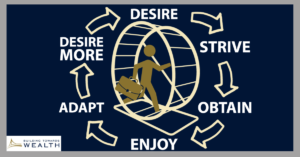We have all seen those commercials that ask us what is our number? That number in the bank account that we think will make us happy. We tell ourselves “If only I can make X per year I will be set” But, whatever it is, I can promise you that when you get there, it won’t seem like enough. You see, we are not conditioned to think of money in terms of “enough,” We will take a look at why that is and how we can combat it in this week’s Newsletter.
The scientific name for this phenomenon is the “hedonic treadmill” referring to the fact that we must make more and more money to keep our level of happiness in the same place. What tends to happen is that our expectations rise and fall with how much we make (as well as other factors in our life), keeping our happiness at a point of equilibrium.
I am sure we have all felt it. Several months after we bought that newer car or a bigger house, that we were so excited to purchase, the joy it brought just is not there anymore. It’s just what we have now, and we are looking for the next bigger and better thing. Just as we reach our former goal, the hedonic treadmill kicks in, and our excitement over having “arrived” is gone in an instant.
Dr. Daniel Gilbert, a happiness expert at Harvard says that pursuing wealth at the expense of more satisfying goals has a high opportunity cost. “When people spend their effort pursuing material goods in the belief that they will bring happiness, they’re ignoring other, more effective routes to happiness.”
Chasing money and material goods is a thirst that we will never quench.
Most people, I believe, want to be wealthy. They want freedom and flexibility, which is what money in the bank provides. They just get caught on the treadmill and they go nowhere, quickly.
The pinnacle of wealth is the ability to wake up every morning and say, “I can do whatever I want today.”
Remember Your Most Valuable Resource Is Time. Use It Wisely!
But it is so ingrained, particularly in the developed world, that to have money is to spend money, that we do not get to see the self-control it actually takes to be wealthy. And since we cannot see it, it’s hard to learn about it.
The problem for many of us is that it is easy to find rich role models. It is harder to find wealthy ones because their success is more hidden.
“Fake it until you make it” might as well be printed on the dollar bill, it is so ingrained in society. But the truth is that wealth is what you do not see.
A way to be wealthy is to not spend the money that you do have. It is not just a way to accumulate wealth; it’s the very definition of wealth. We should be careful to define the difference between wealthy and rich.
So, this brings us to the question, why does it seem that so many people are willing to pay the price of cars, houses, food, and vacations as opposed to investing that money for the potential of good returns?
The results of an oft-quoted Dutch research project into the benefits of anticipation show that the pleasure derived from anticipating something enjoyable, is often equal to or greater than the pleasure derived from the event itself.
This is because we are idealizing the future. Our dream future holiday does not have any litter on the beach or overly persistent sellers in the market. We can stroll in a beautiful dream state through empty landmarks and enjoy dining at any quaint seaside beach shack without stomach issues.
We idealize what the bigger house will do for our level of happiness, but the hedonic treadmill prevents us from getting there because of the desire to purchase more stuff.
As Daniel Crosby Ph.D. said in his book You’re Not That Great
Well, fortunately, or unfortunately (depending on how well-adjusted your parents are), a great deal of happiness comes from our “hedonic set-point” which is genetically determined. A 10-year, longitudinal study of 1,093 identical twins found that between 44 and 52% of subjective wellbeing is accounted for by genetic factors. So, roughly half of what makes you happy is out of your control, sorry to say.
But what about the part that we can control? Of the remaining 50%, roughly 10% is due to external circumstances and a whopping 40% is due to intentional activities, or the choices we make.
With all of this information, including knowing the majority of our happiness is out of our control, what are we to do with it? How do we step off the hedonic treadmill and on to a path of greater happiness?
The first step in fixing a problem is recognizing the problem. Being aware that we, as human beings, are hardwired to be on the hedonic treadmill is a start.
Next is to get comfortable with the idea that the bigger, better thing is sometimes just more and not better. In a money-obsessed world that has socialized us to chase the almighty dollar, it can be weirdly unsettling to learn that money is not everything.
I have had my own struggles, particularly in my 20’s and early 30’s with the treadmill. The fancy house in the trendy neighborhood, the constant dining out at the best restaurants, and regular Vegas & Miami trips did not make me any happier and actually did quite the opposite.
I am going to share some tips and tactics, that are not only backed by research, but I have personally implemented and have made me happier.
- Make sure to have several small pleasures. Be sure your life includes several pleasures and try to plan for them throughout your day. Get that cup of coffee (despite what Suze Orman says, it is not the coffee and avocado toast that is keeping you from being wealthy). Call that friend for a quick laugh. If you feel you do not have time for too many of these pleasures, aim to organize your time with the specific intention of including them.
- Make it a treat Harvard professor and author of Happy Money, Michael Norton says a bit of self-denial is a huge happiness booster: …if you love, every day, having the same coffee, don’t have it for a few days. Once you have it again, it’s going to be way more amazing than all of the ones that you would have had in the meantime… It’s not “give it up forever.” It’s “give it up for short periods of time, and I promise you you’re going to love it even more when you come back to it.”
- Rotate your pleasures so that they always feel new. Just as fresh sheets feel more wonderful than your week-old sheets, a rotation of pleasures is more enjoyable than the same ones for days in a row. This may be different if you enjoy the ritual of certain activities, but it is generally true. When you become slightly bored with your pleasures begin to vary them. My wife may never understand how every few months I wildly change my routine.
- Find time for others. This creates greater meaning in your life, and that can create greater happiness. Just as gratifications can work outside of the hedonic treadmill and help you increase your overall levels of happiness; meaningful activities can create these changes as well.
- Plan in advance Looking forward to things is half the pleasure of them. I am sure we have all felt the excitement as we anticipated that special vacation or dinner. When you do decide to spend on an experience, plan it well in advance. Giving yourself that thing to look forward to can help quench your thirst for spending on other things. My wife and I currently have an extravagant dinner planned when I reach a business goal. I have been dreaming of the dinner for 3 months and probably have another 4 before we realize it.
- Keep a journal. One way to maximize the impact of your positive experiences is to write down the things you enjoyed that day. Aim for three a day. You’ll be reliving these positive experiences as you write about them and can relive them again when you read through your journal.
Many of the best things in life are free but, because they are not all free, be sure to save, save, save. Savings without a spending goal gives you options and flexibility, the ability to wait, and the opportunity to pounce. It gives you time to think. It lets you change course on your own terms.
We are all humans, with all the quirks and imperfections that go along with being human. One of our faults is the need to desire more. That desire has had some very beneficial effects on the development of society. It is hard to argue that the standard of living in the world is better than it has ever been before.
That desire for more has its downside as well. Advertising and media just feed that desire. This is not a blog telling you that you need to stop spending. Just be aware of what is motivating you, and if it does not align with your values, then hopefully I have provided you some tools to help you get off the hedonic treadmill and say enough is enough!


